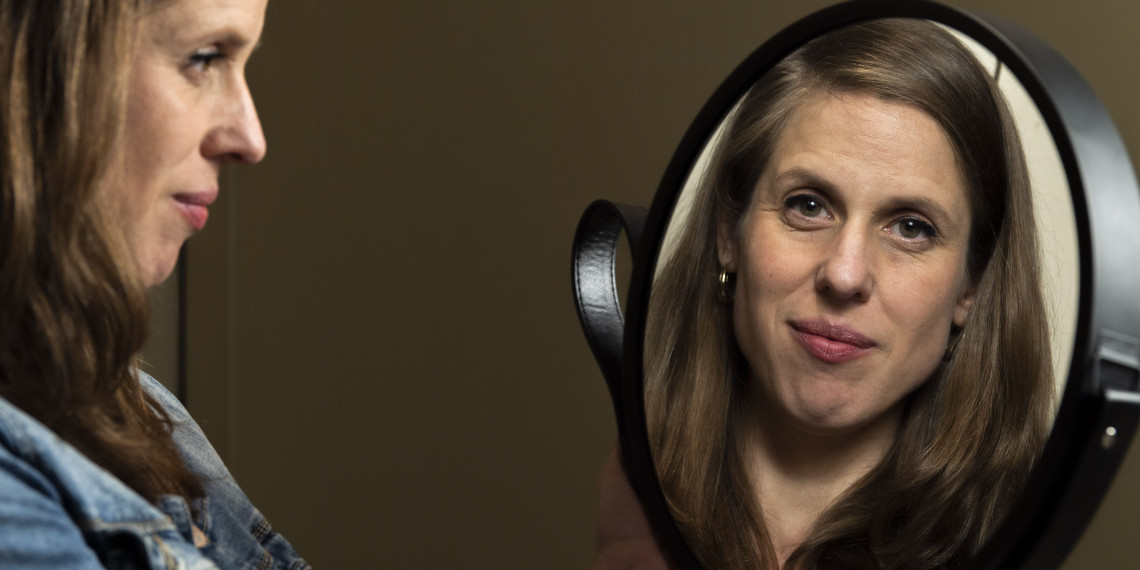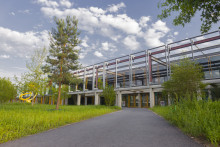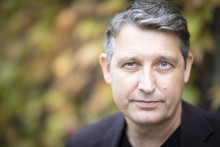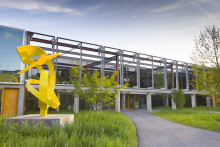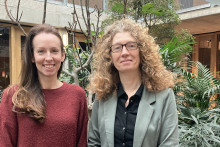Impact. That is the word that comes up the most when Carmen Anthonj discusses her work. Even though she names a seemingly endless list of skills and qualities that good scientists need, it is clear what drives her the most. Making a difference – ‘out there’, in the real world. ‘My work is about improving lives of people and using data to influence decision-makers,’ she says.
‘I actually never planned to be a scientist, because I never wanted to just think and write about problems. I wanted to work on solutions,’ says the Assistant Professor. ‘I was thinking of becoming a medical doctor, an engineer or a social worker. I wanted to work with people who were left behind. I thought that a scientist’s work would be very theoretical and not even close to societal impact.’ Luckily, her MSc supervisor eventually managed to convince her otherwise. ‘I’m so grateful that he supported me to work on research that was useful in practice, and then persuaded me to do a PhD. For my MSc I worked in Namibia and did research into impact of flooding on people with HIV and their access to needed antiretroviral treatment. For my PhD I worked on wetland-use disease exposure and prevention, informing health-promoting wetland management in Kenya. I was so happy to be part of projects that had a big chance of being implemented.'
Carmen Anthonj’s career in a nutshell
2020 – present Tenure Track Assistant Professor of GeoHealth with focus on Water, Health and Decisions at the Department of Earth Observation Science at the Faculty of Geo-Information Science and Earth Observation (ITC) of the University of Twente
2018 – 2020 Postdoctoral Research Associate at the Water Institute at the Gillings School of Global Public Health at the University of North Carolina (UNC) at Chapel Hill (USA)
2017 – present Consultant with various international organizations and institutions, including the World Health Organisation, UNICEF, World Bank, adelphi.
2017 PhD at the GeoHealth Centre at the Institute for Hygiene and Public Health (IHPH), University Clinics Bonn, Germany
Despite her initial reservations, Anthonj now holds a tenure track position and is on the path of becoming a full professor. ‘But the title was never the goal for me,’ she says. Instead, she prefers to use her role to influence as many people as possible. ‘Reaching a broader public is one of the most important aspects of science for me. I want everyone to understand what I do. I love science communication and having the opportunity to bring our work to policymakers. A good scientist is not necessarily someone who drives change, because every scientist is different and every discipline is different, but for me that is the goal.’
‘I want everyone to understand what I do’
‘It’s interesting to think about what the most important qualities and skills are in academia,’ the scientist continues to reflect on her way of working. ‘In academia, you need leadership skills and those are often lacking. In science, we often see bosses, not leaders. I’m doing everything I can to not become a boss.’ Instead, she works towards becoming a ‘transformational leader’, says the Assistant Professor. ‘You need to constantly reflect on what you do. You need to keep a ‘bird’s eye view’ of what you do and why – you need to think of what is on the global agenda, what the societal challenges are and how you can contribute through your research to addressing those challenges. You need to be aware of your social responsibility.’
‘It’s not about checking boxes’
That is only one of the many things a scientist needs to keep in mind. As Anthonj points out, academics have to be good jugglers. ‘Especially in the past, it was important to be excellent in everything. You had to maintain a large network, you had to focus on your impact factor, on what grants you bring in, where you publish, what courses you teach and how you contribute to education, you had to consider the real-world impact and institutional strengthening – or capacity building as we used to call it. That is a lot, and not always aligned with the individual talents of a scientist. I’m really lucky that I can design my own path. It’s not about checking boxes anymore.’
Carmen Anthonj’s research in a nutshell
Carmen Anthonj is an expert on Medical Geography which links health and disease in space and time. She studies where and when diseases occur, contextualizing diseases with environmental and social factors. More specifically, Anthonj focuses on the links between water and health issues. She investigates how water, sanitation and hygiene infrastructure and behaviours can promote human health and how they can impair human health. She studies how WASH - water, sanitation and hygiene - can prevent water-related infectious diseases, and how the WASH situation differs in different regions and among different populations. She also investigates the impact of flooding on human health, and health-related infrastructure, and the cultural context of water and health.
Carmen Anthonj is a geographer working in global public health, focused specifically on issues related to water and health in space and time. Her research is highly applied and driven by real-life challenges. She has spent a lot of time working in the field, living in remote villages and immersing herself in the lives of the people she wanted to help. ‘I have spent months of my life in different African countries, in the South Pacific, in Southeast Asia and in Latin America,’ she says. ‘I mainly do empirical research, meaning talking to people in the field. To be good at this, you need an open mind, the right network of stakeholders and empathy – without it, you will not be able to understand the problem that you are trying to solve.’
‘I was always aware that there was injustice in the world’
At the moment, the ITC researcher is working on a new project aiming to understand what challenges people experiencing homelessness face when it comes to access to water, hygiene and health. ‘I think of this project as the highlight of my career because it is so close to my heart,’ says Anthonj. ‘I used to cook in a soup kitchen for homeless people in Germany for several years, and I’m so happy that I lead this project. It is a direct collaboration with people experiencing homelessness, with social workers, with city planners and other scientists. Our goal is to raise awareness of the challenges they are facing and help them get the facilities they need, such as free public toilets and water fountains. Together we map what infrastructure already exists, where it is needed and how it should be improved.’
The drive to help others was always there, at least partly thanks to her father. ‘In my family, we were raised aware that we are very lucky to have everything we need,’ shares Anthonj. On weekends, young Carmen and her family would cycle from her village to the market in the town nearby and buy more food than needed. On their way back home, they’d stop by the church where people would be staying and asking for money, and they’d give them the extra food they had bought for them, or some coins. ‘I think, thanks to my upbringing, I was always aware that there was injustice in the world and that it’s important to share – share your possessions but also your knowledge.’
‘Diversity in science is so important’
Doing ‘good’ science and bringing ‘good’ to the world is a clear motivation for her, but that would not be possible without the right support, stresses Anthonj. ‘I have a lot of support from my partner, from our family, from friends, which is something that cannot be taken for granted,’ says the scientist. ‘I have a young son at home, and our families don’t live nearby. I’m very lucky to have a partner who does as much for our family as I do, who is flexible and compromises a lot. And I am doing my best to support him as much as he supports me – because he is also a scientist, and he is as passionate about his work as I am. That is why diversity in science is so important.’
Support in the workplace is equally vital. ‘To do good science, you need an open mind,’ says the researcher. ‘You can’t do that if you are constantly rushing and struggling to keep up. I love the fact that I am supported to prosper in one area – which in my case is the link between research and capacity building. To facilitate this, you need the right environment to work in. You need flexibility and the trust of your employer to be productive and creative. That should not be underestimated. You cannot thrive under pressure.’



